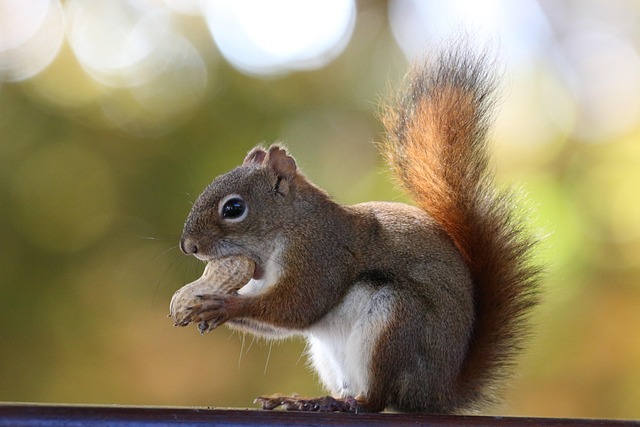Understanding squirrel behavior is crucial for successful landscaping modifications that deter them from gardens without harming them. Eco-friendly solutions include planting aromatic deterrents, using physical barriers like mesh netting, and employing creative methods like fencing and herb repellents. Strategic plant selection, thoughtful garden design, and natural repellents are key to implementing these solutions effectively while promoting an eco-balanced ecosystem.
Landscaping your garden is an art, but keeping it free from unwelcome visitors like squirrels can be challenging. Understanding these furry creatures’ behavior is the first step towards choosing effective yet eco-friendly deterrents. From physical barriers to strategic plant selection and chemical-free options, this guide offers creative solutions to create a squirrel-resistant haven without causing harm. Discover how to transform your garden into a harmonious balance between beauty and nature with these innovative, environmentally conscious methods.
Understanding Squirrel Behavior: Key to Choosing Eco-Friendly Deterrents
Understanding squirrel behavior is crucial when implementing landscaping modifications to deter them from gardens. Squirrels are intelligent and adaptive creatures, often learning quickly from their experiences. They are highly curious and will explore new areas, especially if they find a rewarding food source. To discourage squirrels, it’s essential to identify their preferred activities—such as foraging for nuts and seeds—and use this knowledge to choose eco-friendly deterrents.
Eco-friendly squirrel solutions focus on natural methods that don’t harm the animals but rather disrupt their behavior. For example, planting deterring plants like lavender, mint, or marigolds can repel squirrels due to their strong scents. Physical barriers, such as mesh netting or specialized squirrel-resistant plant protectors, are also effective while maintaining a garden’s aesthetic appeal and ecological balance.
Physical Barriers: Creative Ways to Keep Squirrels at Bay Without Harming Them
Many gardeners opt for physical barriers as a humane and effective way to keep squirrels at bay. Instead of harmful chemicals or traps, creative eco-friendly squirrel solutions can be employed. One such method is using sturdy fencing made from natural materials like bamboo or wood chips. These fences should be buried slightly beneath the ground and extended several inches above it to prevent burrowing. Another innovative approach involves planting squirrel-repelling herbs like mint, rosemary, or lavender around the garden perimeters, leveraging their strong scents to deter these furry visitors naturally.
Fencing can also be paired with strategic tree trunk coverings or mesh screens to block access points. For areas with significant squirrel activity, a multi-layered barrier approach may be necessary. Additionally, maintaining a clean garden by promptly removing fallen fruits and nuts reduces food incentives for squirrels to return. These simple yet effective eco-friendly squirrel solutions not only protect gardens but also coexist harmoniously with these charming wildlife inhabitants.
Plant Selection and Garden Design: Creating a Squirrel-Resistant Haven
In the quest for an eco-friendly squirrel solution, plant selection and garden design play a pivotal role in creating a haven that deters squirrels without causing harm. By understanding squirrel behavior and preferences, gardeners can strategically choose plants that are less appealing to these furry visitors. For instance, opt for thorny shrubs and trees as natural barriers, as squirrels tend to avoid areas with dense, spiky vegetation. Incorporating plants with strong scents like lavender, rosemary, and marigolds can also act as effective deterrents, repelling squirrels due to their powerful aromas.
Garden design itself can be an eco-friendly squirrel solution. Creating paths and designated areas with minimal plant density makes it less inviting for squirrels to forage. Rock gardens or patches of gravel can serve as visual cues, signaling to squirrels that these spaces are not suitable for food-seeking activities. Additionally, ensuring proper spacing between plants reduces the ease of squirrel navigation, making it more challenging for them to access desired treats.
Chemical-Free Options: Repellents and Natural Solutions for a Balanced Ecosystem
When it comes to keeping squirrels out of your garden, there are numerous chemical-free options that offer effective and eco-friendly solutions. Repellents made from natural ingredients like garlic, chili peppers, or citrus peels can deter squirrels without causing harm to pets, wildlife, or the environment. These repellents can be applied directly to plants or mixed into water and sprayed onto garden areas.
Promoting a balanced ecosystem is key to long-term success. Instead of relying on toxic chemicals, consider planting squirrel-resistant flora that naturally discourages these furry visitors. Thorny bushes and plants with strong scents can act as physical and olfactory barriers, making your garden less appealing for squirrels while fostering a healthier, more diverse habitat for other beneficial creatures.
When it comes to landscaping modifications for deterring squirrels, understanding their behavior and implementing creative, eco-friendly solutions are key. By combining physical barriers, strategic plant selection, and chemical-free options, you can create a balanced ecosystem that keeps squirrels at bay without causing them harm. Adopting these strategies allows you to enjoy a beautiful garden while fostering a harmonious relationship with nature. Embrace these eco-friendly squirrel solutions to transform your garden into a peaceful haven for both you and the local wildlife.
